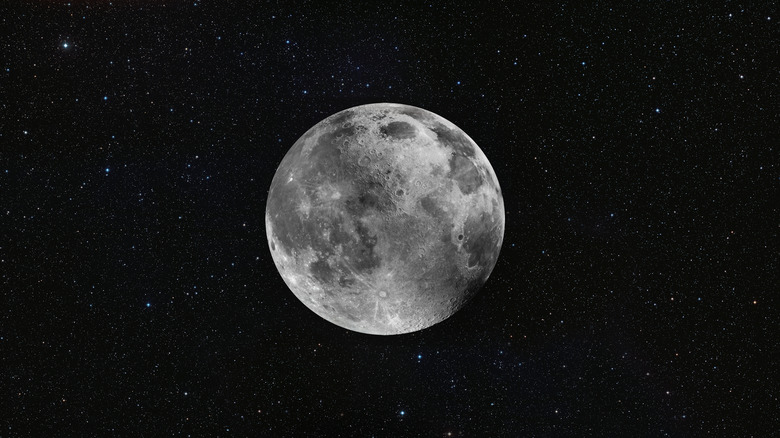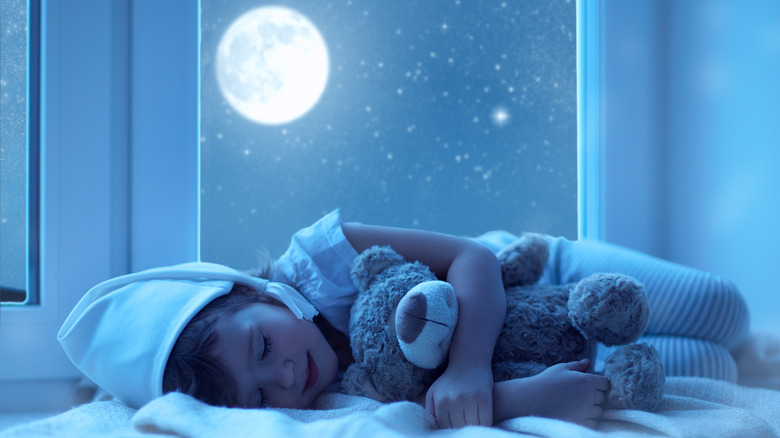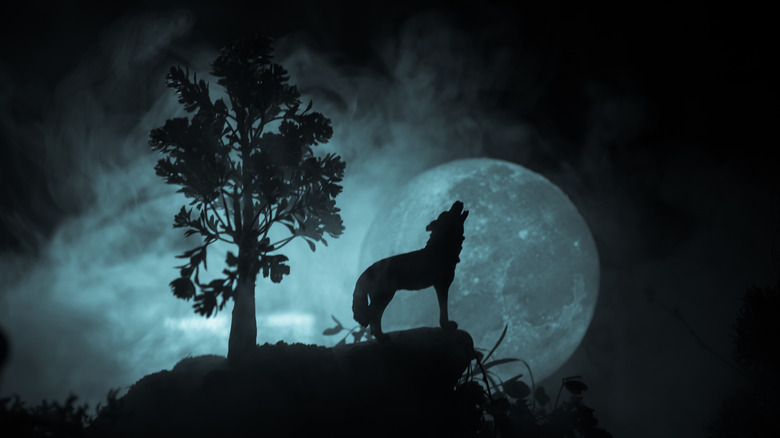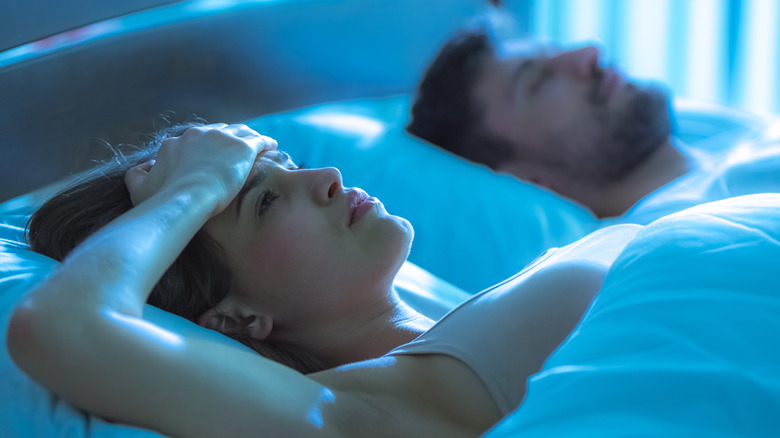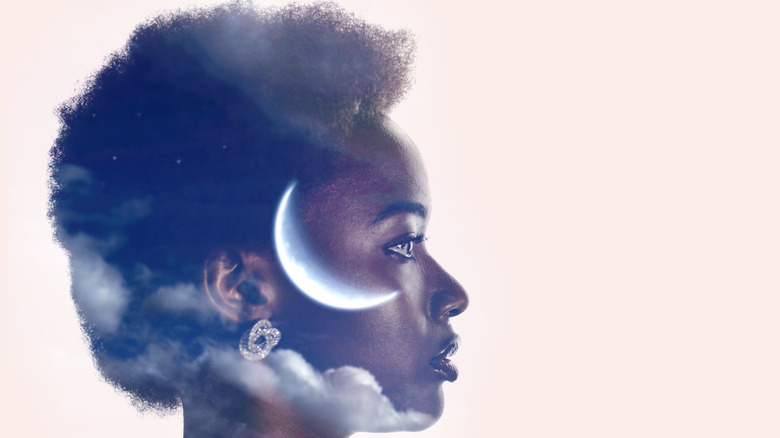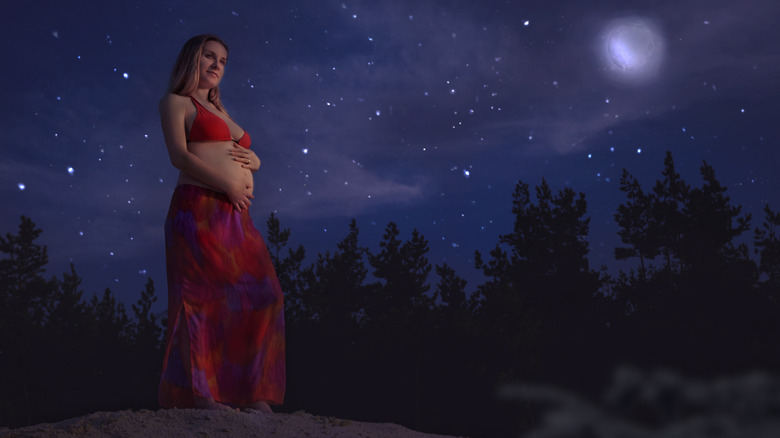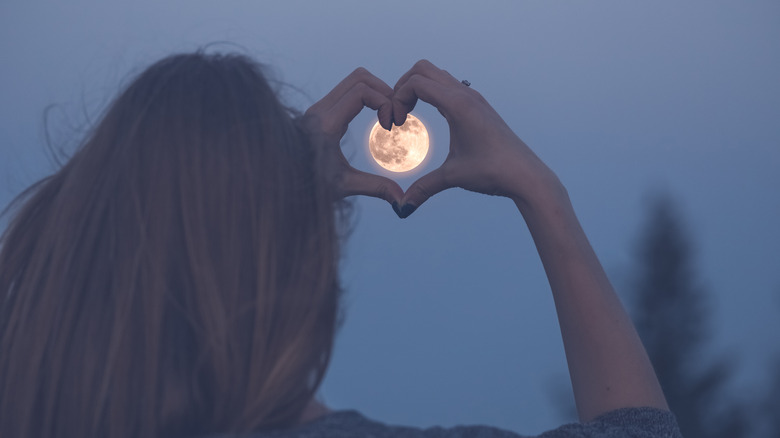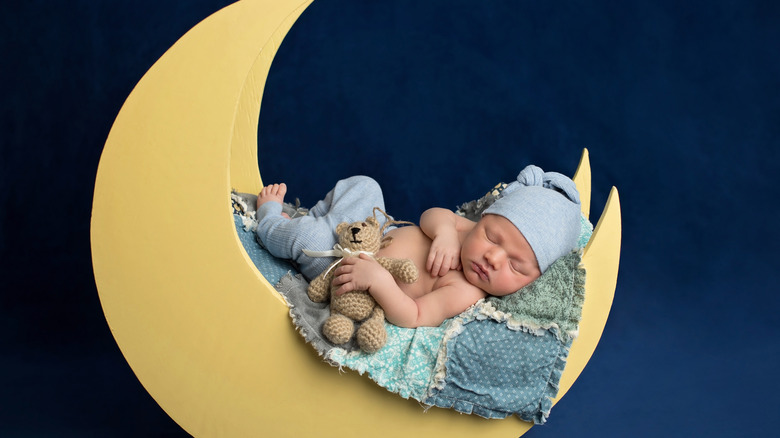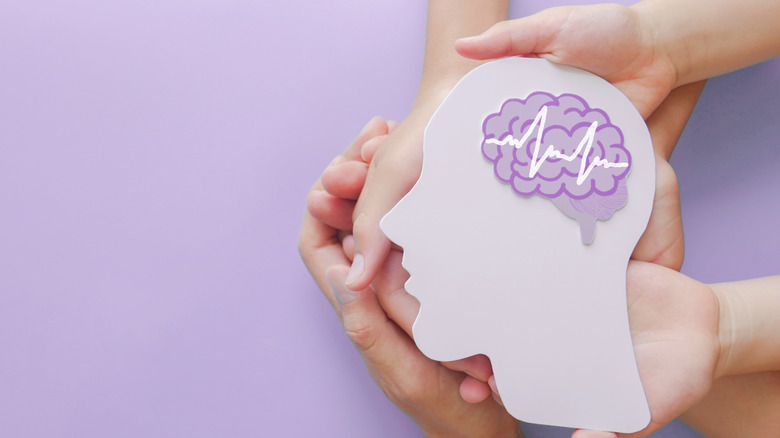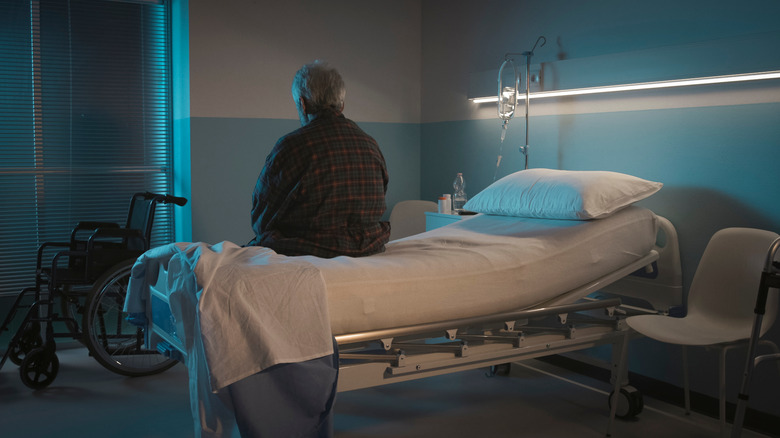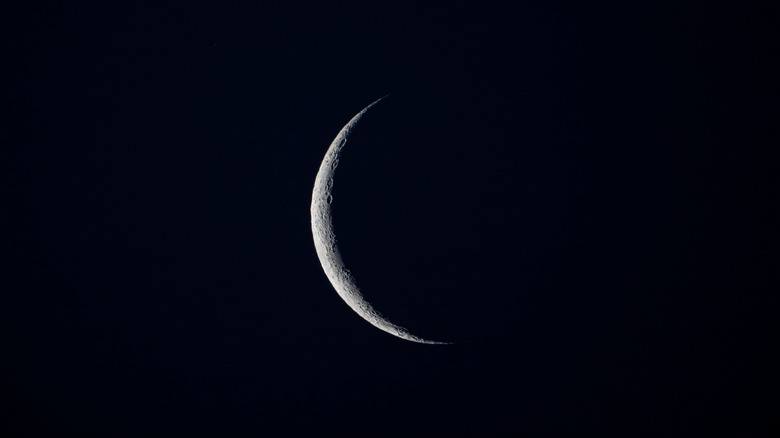What You Should Know About The Full Moon And Your Health
Human beings have long wondered about the moon's effect on the human body and psyche. The longstanding belief that different lunar phases can elicit peculiar behavior, and even trigger mental illness, dates back to the Hippocratic period, say historians. And while there remains a cloud of mystery around the possible connection between the moon and how we act and feel, the idea has floated around scientific circles for decades and isn't completely unfounded (via New Scientist).
And it's perhaps not so surprising. After all, the ocean's tides are governed by the moon's gravitational push and pull, and various animals use the moon as a compass to facilitate navigation and guide reproductive behaviors (via Natural History Museum). This led the Greek philosopher Aristotle to suggest that the human brain — which is largely made up of water — must also be susceptible to these forces (via Scientific American). But many scientists argue that the moon's gravity isn't powerful enough to alter brain activity or human physiology, pointing out that it only exerts its force on large, open bodies of water like the sea and lakes.
Although there's little conclusive evidence for the relationship between Earth's celestial companion and our mental and physical wellbeing, research shows that almost 81% of mental health professionals continue to attribute certain ailments to the full moon, and this ancient belief persists among many physicians today. Here are some intriguing and unusual ways a full moon is said to impact our health.
It can change your sleep patterns
It's not uncommon for people to blame the moon for a lousy night's sleep. And research appears to suggest that the idea isn't entirely steeped in folklore. A 2021 study showed that our sleep fluctuates during the lunar cycle: Using wrist monitors to track participants' sleep habits, researchers observed that on the nights leading up to a full moon, people generally went to bed later and slept fewer hours than normal. These patterns were present in both urban and rural environments, irrespective of whether or not communities had access to electricity. This led to the theory that natural light emitting from the moon as it cycles towards its full phase "stimulates nocturnal activity," making it harder for people to fall asleep.
An earlier 2013 study found that on a full moon night, it took people five minutes longer to fall asleep, they slept 20 minutes less, and had 30% less time in deep sleep (via Current Biology). To ensure that these results weren't caused by moonlight, the study was conducted in a darkened sleep laboratory, where the amount of light exposure was controlled. But many follow-up studies haven't been able to confirm these findings, calling into question the purported relationship between our natural circadian rhythms and the moon's shifting phases. "The conundrum of 'lunar effects on sleep' represents an exemplary case of a scientific question which should be approached with caution, as it may seem much easier than it will likely be," noted the authors of a 2014 study.
It may affect your mental health
The idea that the moon somehow influences how we function and feel dates back to ancient mythology. A full moon night is when we're most likely to metamorphose into a werewolf — a legend that first appeared in the philosophical texts of ancient Greece and Rome, and stemmed from the fear and taboo of cannibalism, according to historians (via Medicine, Science and the Law). The belief in the moon's ability to make us go haywire even made its way into everyday parlance: The antiquated term "lunatic" is derived from the Latin word for madness, "lunaticus," which originates from "luna," denoting the moon (via Journal of the History of the Neurosciences).
A 2018 study of patients with rapid-cycling bipolar disorder dug deeper into the potential link between the moon and mental illness (via Molecular Psychiatry). Patients' mood swings synchronized with the 13.7-day and 14.8-day lunar cycles — which also dictate the ocean's tides — shifting between mania and depression in a patterned way. Changes were also observed every 206 days, around the same time as the "supermoon," when the full moon is at its closest to the Earth in its orbit. Perhaps these effects may be chalked up to the moon's brightness, which can lead to sleep deprivation, suggested the researchers. A 2017 study, on the other hand, discredited the moon's tumultuous impact on our mental health: Findings showed that there was an equal number of psychiatric hospital emergency visits throughout the month, debunking the theory that visits increase when the moon fills out (via Advances in Mind-Body Medicine).
Is there really a link between the moon and epilepsy?
The alleged relationship between the moon and epilepsy has ancient roots. As early as the first century, both the Roman naturalist Pliny the Elder and the Greek physician Aretaeus of Cappadocia attributed epilepsy to the presence of a full moon — an association that has spanned centuries and continents (via Journal of the History of the Neurosciences). The former believed that the moon's dew caused the brain to become "unnaturally moist," triggering epileptic attacks. Nowadays, epilepsy is recognized as a neurological disorder with no single identifiable cause, where normal brain function is interrupted by a burst of electrical activity (via Mayo Clinic).
Some medical professionals still make an association between a full moon and seizures. According to a 2008 study published in Epilepsy & Behavior, epileptic seizures increased during a full moon period, except when there was a cloud cover, suggesting that seizures might be due to the moon's glow. But another study from the same journal offered up conflicting evidence, implying that the observed connection between the moon and epilepsy may simply be down to chance. "Contrary to the myth, epileptic seizures are not more common during a full moon. In fact, we found the number of epileptic seizures was lowest during the full moon and highest in the moon's last quarter," explained study author Selim Benbadis via Epilepsy Today, adding that, "Some people still seem to like poetic, mysterious, and irrational explanations for puzzling diseases like epilepsy."
Menstrual cycles synchronize with moon cycles
The supposed connection between menstruation and the moon is entrenched in many cultures, reinforced by the fact that the average duration of a woman's cycle matches that of the lunar cycle — around 29.5 days (via The Scientist). And as it turns out, there's some actual science to back this association up. Early research showed that women whose cycle lengths are 29.5 ± 1 days tend to start their periods when the moon is full, and are less likely to do so as the moon wanes (via Human Biology). A recent study also uncovered that some women's periods intermittently sync with the moon's luminance and gravity cycles, but with age and exposure to artificial light, menstrual cycles become shorter, and this synchronicity diminishes (via Science Advances). The researchers hypothesized that in ancient times, menstrual cycles may have been more in tune with the moon, but this has shifted with the advent of a modern lifestyle.
The moon's role in the onset of menses has been challenged, however, with some studies suggesting that the similar length of both cycles is merely a coincidence (via Endocrine Regulations). A 2019 study used the period tracking app Clue to collect data from 1.5 million women, and discovered that there was no correlation between menstrual and lunar cycles. "Period start dates fall randomly throughout the month," reported Marija Vlajic Wheeler, a data scientist at Clue, pointing out that the menstrual cycle often fluctuates and doesn't always follow the same pattern.
It's believed to influence your fertility
The idea that fertility is tied to the moon's cycle can be traced back to ancient mythology (via Journal of Reproduction & Infertility). The moon and its distinct phases were commonly perceived as a symbol of reproduction and fertility. In the 1950s, Czech doctor and astrologer Eugene Jonas devised a family planning method based on old Assyrian texts, postulating that a woman's fertility peaks during the specific moon phase that she was born under (via History). What's more, the reproductive cycles of various animals including sea-dwelling worms and coral reefs are timed around the lunar cycle, note researchers via the Journal of Molecular Biology.
The moon's relationship with fertility has also been investigated by scientists. According to early research in the journal Human Biology, women whose menstrual cycles mirror the length of the lunar cycle are generally more fertile — though, some consider this to be an "intriguing biological coincidence." Another study proposed that women with cycles of this length tend to ovulate around the "dark phase" of the moon cycle (when there's a new moon), pointing to the theory that a lack of moonlight may have meant it was more prudent for our ancestors to remain in their shelters, making babies instead of venturing into the dangerous outdoors (via The Scientists).
It might affect your blood pressure
In a scientific paper published in The American Journal of Psychiatry in 1972, psychiatrist Arnold Lieber put forward his theory of "biological tides." He claimed that the moon's gravitational prowess causes "cyclic changes in water flow among the fluid compartments of the body." More recent studies have shown mixed results about how the moon might somehow bring about changes in our bodies, for example, affecting the activity of the cardiovascular system, and precipitating changes in blood pressure.
A 2013 study of male university students revealed that heart rate and blood pressure readings plummeted during a full moon and new moon period. The participants also had quicker heart rate recovery times on these days. The study authors reported that people's bodies appear to be more physiologically efficient during the new and full moon phases of the month (a hypothesis that beckons further testing, no doubt). But other researchers have argued that there doesn't seem to be a tenable link between the lunar cycle and changes in blood pressure. A 2020 study of male Taekwondo athletes showed that participants' athletic performance — including their balance, reaction-time capabilities, and physiological and psychological parameters — remained the same throughout different moon phases (via Journal of Sports Medicine and Physical Fitness).
You may be more accident-prone on a full-moon night
Some people are convinced that there's a spike in the rate of accidents whenever there's a full moon. Several studies have set out to explore whether there may be a kernel of truth to this legend, including a 2017 study published in the British Medical Journal, which analyzed 13,029 motorcycle fatalities in the United States between 1975 and 2014. The findings showed that accidents shot up by 5% when the full moon came out, and that injuries were even more common on the night of a "supermoon," rising by 32%. The explanation for this might come down to the moon's striking luminance in the sky, which engenders "wonderment" and creates "a natural distraction," rather than any inherent mystical quality, explain the study authors. They also point out that the supermoon amplifies the lighting of surrounding landscapes, which might cause motorcyclists to miscalculate their speed and distance.
Still others believe that there's an uptick in accidents due to "full moon madness," whereby the moon stirs up erratic emotions and behaviors — according to a 2011 study from the World Journal of Surgery, 40% of medical professionals believe that human behavior is connected to the lunar cycle. But a number of studies have gone on to quash these theories. A 2018 study examined the association between the lunar cycle and injury risk in soccer players, taking into consideration moon illumination, earth-to-moon distance, and tidal coefficient (via Chronobiology International). It showed that neither the full moon nor the new moon had a significant effect on the number of injuries.
Pregnant women could be more likely to give birth
The superstition about the moon's power to induce labor has been around for a while. And oddly, some research nods to a possible relationship. A 2010 study of the frequency of births in Japan discovered that there was a significant rise in birth rates when the gravitation of the moon was at its most powerful, namely when it was closest to the earth. The authors admit, though, that further research is needed to understand how and why this association actually exists. Other researchers have gone on to debunk the "myth" that the moon's gravitational pull can send a woman into labor: The findings of a 2008 study (via Acta Obstretricia Gynecoligica Scandanavica) and a 2015 study (via Nursing Research) both failed to identify an uptick in births during a particular phase of the moon.
Besides the longstanding theory that childbirth is more common during the full moon, some cultures uphold the belief in a "lunar effect" on gender. A 2005 Nepalese study suggested that not only can conceiving at specific times of the lunar cycle ramp up fertility, but it may also determine your child's gender: Women who ovulated and conceived a child around the time of the full moon were more likely to give birth to a boy, whereas those who got pregnant prior to a full moon often had a girl.
It may increase your risk of kidney stones
Given the moon's effect on the Earth's tides and ecosystems, it may seem reasonable to assume that its gravitational energy might tug at our bodies in a similar way. The human body and its organs are made up of about 80% water, after all (via Scientific American). Interestingly, research has pinpointed a mysterious link between the incidence of kidney stones and the looming presence of the moon. A 2011 study from the Journal of Urology showed that patients were significantly more likely to report kidney stone pain around the full moon. And a 2007 study published in Current Urology noted that emergency urological admissions increased on full moon days and were lower on new moon days, which appeared to have a "calming" effect on patients instead.
Other studies have churned out conflicting findings, however: In a 2016 longitudinal study from the journal PLOS One and a 2011 longitudinal study from Emergency Medicine International, neither the full moon nor the supermoon were found to bring about a surge in kidney stones or a diagnosis of urological conditions.
It might affect your mortality
Many doctors and nurses still look to the full moon as a harbinger of chaos and bizarre events (via The Wall Street Journal). Some even take this day off or avoid scheduling surgery based on the notion that the moon may lead to complications — and there's even some scientific evidence to support this. A 2013 study from the journal Interactive Cardiovascular and Thoracic Surgery discovered that people who underwent surgery for a life-threatening tear in the aorta were 79% less likely to die during the waning full moon than those who had surgery during a new moon phase. The patients also had shorter hospital stays when recovering during a full moon. That said, David Friedman, chief of heart failure services at North Shore-LIJ's Plainview Hospital, told MedicineNet: "Although the findings (of the aforementioned study) showed decreased chance of death and shorter hospital stays of those patients who had aortic dissection repair during a full-moon period, I don't think enough data is yet available to draw any meaningful generalizations." Another 2016 study showed that patients receiving surgery during the waxing moon were more likely to experience an intraoperative complication, describing the results as a "surprising curiosity (that) defies our ability to find a rational explanation."
Other researchers have questioned the moon's influence on surgical outcomes and mortality: Based on a 2009 study that tracked operations occurring between 1993 and 2006, the timing of the lunar month had no real bearing on the outcome of heart-related surgery.
It can raise your chances of a stroke
Physical and psychological ailments of all sorts were once blamed on witchcraft, possession, and of course, a full moon (via Journal of the History of the Neurosciences). Some physicians and researchers still believe that your chances of having a stroke might be written in the stars. A 2008 study in the Journal of Psychosomatic Research looked at hospital admissions between January 1993 and September 2006 and found that there was a significant correlation between the phase of the moon and medically unexplained stroke symptoms — including headaches, numbness, and coordination problems, with diagnoses — which commonly occurred on full moon and new moon days. The authors admit that while the "gravitational effect on water masses of the human body has been proposed," the scientific mechanism for this relationship "remains elusive." However, a subsequent study failed to find an interaction between moon phase and stroke occurrence, describing it as just another urban legend (via Chronobiology International).
It can cause gastrointestinal bleeding
A slightly less common clinical syndrome that's been ascribed to the moon's gravitational energy is gastrointestinal bleeding. A 2004 study published in the International Journal of Nursing Practice reported that the number of hospital admissions related to gastrointestinal hemorrhage and bleeding went up noticeably when there was a full moon gleaming in the sky. "It has been observed that the tides are stronger during the full moon and the new moon, when the earth, the sun, and the moon are in a line," claimed the study authors, hinting that a similar gravitational effect may give rise to the peculiar physical changes that occur in the human body around this time of the month.
However, a 2015 follow-up study from the journal Nursing Research challenged these enigmatic findings. The researcher concluded that there was no significant rise in hospital admissions for gastrointestinal bleeding on full moon days than on non-full moon days, citing "a number of methodological and statistical flaws" and "powerful cognitive biases" in the aforementioned study that could have paved the way to these fascinating (but misleading) results.
It's associated with a higher rate of aneurysm rupture
There's a common, though somewhat uncanny, idea within the medical community that the incidence of intracranial aneurysm rupture increases at certain stages of the lunar cycle. While this is mostly based on anecdotal experiences, some research has explored the connection between the two variables, yielding a mixed bag of results. A 2017 study published in the journal Interventional Neuroradiology showed that the development of ruptures may be specifically related to the phases of the new and full moon — it was found that ruptures were more common when the moon was least illuminated (new moon) and at its brightest (full moon) rather than in the middle of the lunar cycle.
However, a review study published the same year in the journal BMC Neurology failed to find a similar pattern. After assessing patients that were admitted to the hospital for ruptured intracranial aneurysms between 2011 and 2014, the researchers came to the conclusion that there was no apparent association between aneurysm rupture and the big shiny rock in the sky.
Still, the authors admit that "it is difficult to ignore a common belief among medical professionals that the moon has an impact on human health"; More realistically, the moon might affect other risk factors for intracranial aneurysm development like our sleep and blood pressure, and so it should continue to be studied in the future, with rigorous approaches undertaken and findings interpreted cautiously and humbly.

